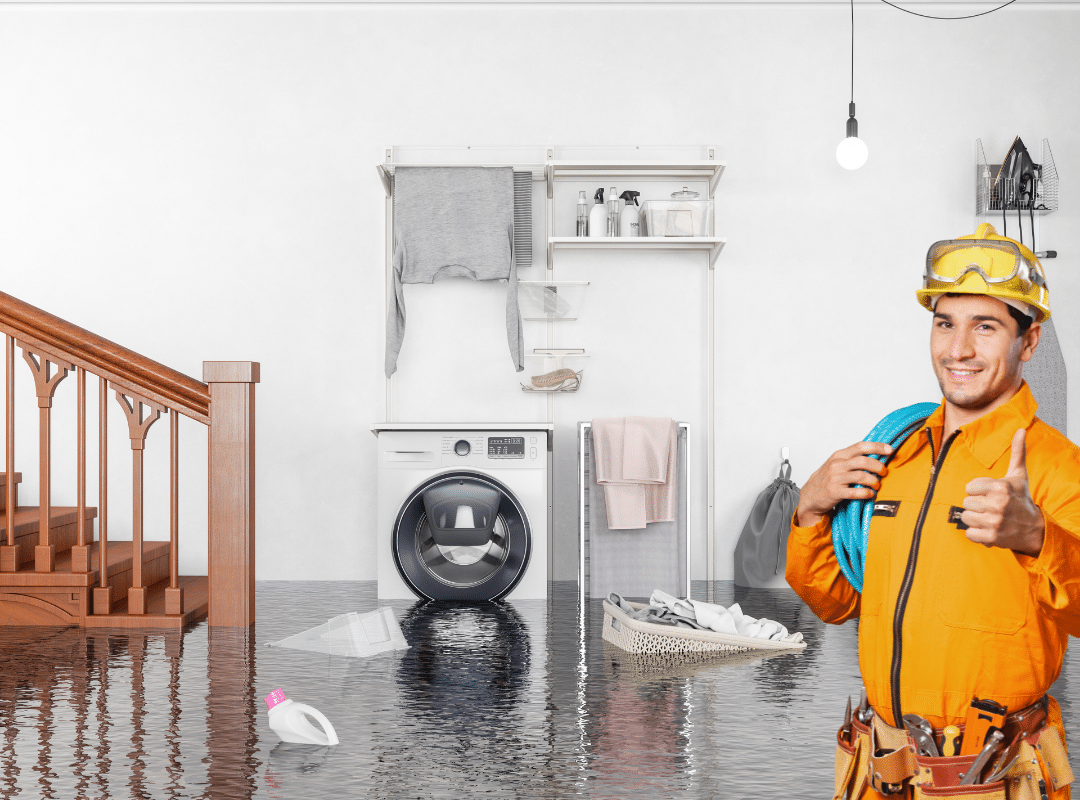How Do I Deal with Appliances that Have Water Damage?

DO NOT attempt to turn your appliances on
This is the most important piece of advice that we can give you. Turning on the power to an appliance that’s had water damage to its motor and electronic components creates the risk of electrocution. Electricity and water don’t mix.
Many homes, especially older ones, don’t have separate circuits, so there’s the risk you’ll blow all the fuses in the house by turning on one water damaged appliance, and cause a fire. Turn all appliances off, and call a professional service technician to assess the damage and the risk, and whether each appliance can be fixed or not.
Be cautious if there’s still standing water present
If there’s still standing water in your house and your appliances were left on when you left, there's a real danger of electrocution even entering the house. If you can get to the mains power to turn it off safely from outside, do this before even going in. If you can’t, then ring your power company to do it for you.
There may also be bacteria and sewage mixed in with the standing water, which can be extremely hazardous to your health, not to mention your appliances’ internal componentry. Your appliances will need to be cleaned and sanitised very thoroughly, before repair.
Know which appliances are potentially salvageable
Some of your home appliances may be able to be salvaged, but it varies by appliance and is based on how much water damage (and bacteria) that they’ve been exposed to.
Potentially salvageable
- Oven: your oven may be salvageable, but will need to be checked carefully first – remember, do not turn it on to check for yourself. Fuses, elements and switches will all need to be checked by a qualified technician.
If you have a gas oven, get a gasfitter to check it’s not leaking gas into your home, and its gas controls will likely need to be replaced. If you can smell gas, don’t enter.
- Refrigerator: depending on how high the flood waters reached, your fridge may be able to be repaired. The relay and the overlay on the compressor will need to be checked by a technician, and most likely replaced. Your fridge’s insulation may have got wet and will take time to dry, making it susceptible to mould. Keep an eye on it, and clean and sanitise it and the seals thoroughly with bleach.
- Washing machine and dryer: these will need to be dried out and tested by a technician, as the motors are generally at the base. If your dryer is wall mounted, it may have escaped unscathed, unless water has damaged or seeped through the ceiling above it.
- Air Conditioning Unit: the external unit of your air conditioner may have been partially or fully submerged, and will need to have its motor checked thoroughly by an authorised HVAC technician or electrician, before you even consider turning it on. The relay and compressor may need to be replaced, and the circuit board tested.
Unlikely to be salvageable
- Dishwasher: this is one appliance that is unlikely to be salvageable. Its motor is in the base and will have been exposed to the worst of the damage, since most dishwashers sit on the floor.
- Small appliances: vacuums, steam mops, heaters, TVs, DVD players and many other small appliances that tend to be stored lower to the floor (and are therefore likely to have been sitting in water) are unlikely to be repairable. You may be able to get them tested, but it might not be worth the expense, especially if it’s been submerged.
Catalogue what’s been damaged
Take stock of what’s been damaged, and record any expenses you incur for repairs; you’ll need this for claiming against your home insurance. Depending on what level of insurance you have and who you’re insured with, investigate whether your appliances and other belongings are covered by flood and water damage. Product warranties may not cover the appliance individually for this type of damage, but it’s worth asking.
Don’t be tempted to try and fix water damaged appliances yourself
Your appliances’ motors and circuits will likely have some, if not extensive, water damage. Attempting to repair them yourself is not advised. Professional electricians and service technicians know what to do when appliances have been exposed to water, and will be able to advise if the item is repairable, and how much it will cost.
Dealing with the aftermath of flood-related damage can be heartbreaking. Here at WW Spares, we can provide reliable and honest technical advice and can connect you with authorised appliance service technicians in every region, to help you deal with your damaged appliances. These technicians have access to wholesale pricing through us, to keep the costs down of your repair bill.
If you’ve been impacted by the recent floods across NSW and Queensland, get in touch before you try and deal with damaged appliances yourself – we’re here to help.
